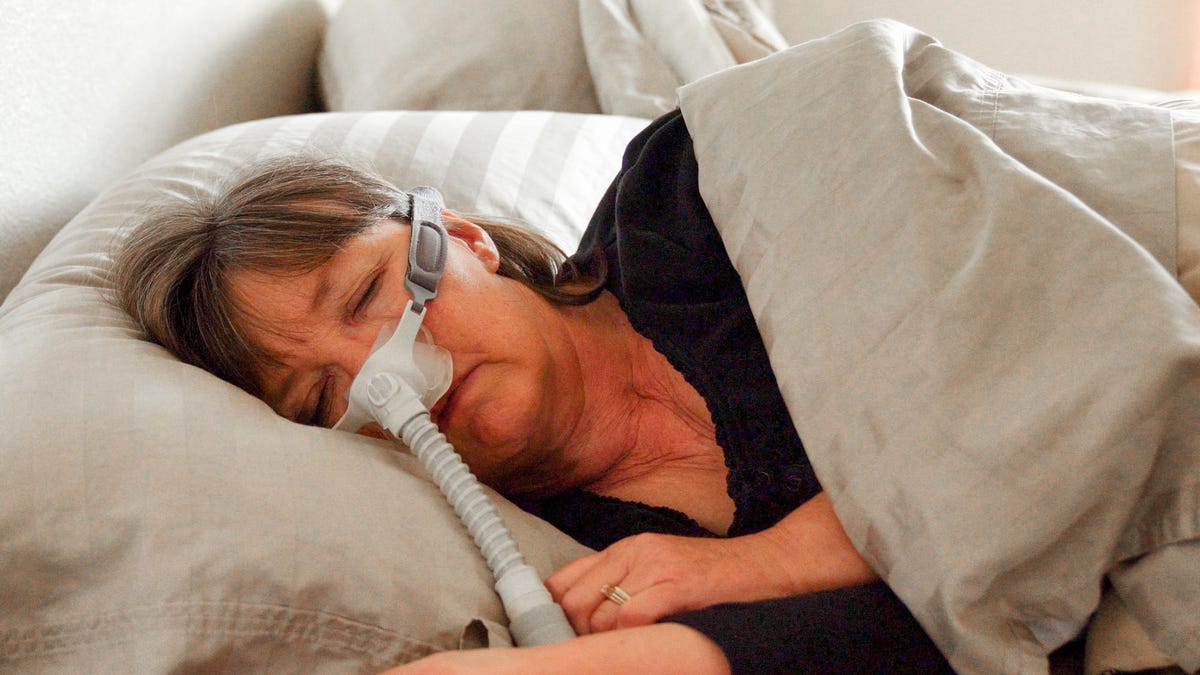CPAP machines: How to pick one you won't hate
Like shorts and shoes, CPAPs aren't one-size-fits-all. Here's how to choose one that won't keep you awake all night.

Wearing a CPAP machine can help you avoid the serious symptoms of sleep apnea, but only if you choose one that works well for you.
If you have sleep apnea, there's a good chance you use or should use a continuous positive airway pressure device (CPAP) to help you stay asleep at night. (And sleep is key to wellness!)
Unfortunately, the masks that come with these machines and fit over your airways are not always comfortable. And then, the machine that's supposed to keep you sleeping soundly can easily become the biggest reason you can't sleep .
Choosing a CPAP machine can be overwhelming, especially if you're claustrophobic or picky about sleeping positions. But armed with the right information, you can find a CPAP that keeps you in dreamland all night long.
Read more: 14 proven ways to get better sleep
What's a CPAP and how do I choose one?
A CPAP sends a constant flow of air through your airways during sleep to ensure that your throat doesn't narrow and cause the "apnea" in sleep apnea, or the brief pause in your breathing.
The most common treatment for sleep apnea, CPAPs help you stay asleep and avoid the daytime fatigue and other symptoms associated with the condition. That is, if you choose the right kind.
"Most importantly, [look] for comfort and to ensure that it doesn't result in pain to the bridge of the nose or the upper lip, which might result in sores," Dr. Clete Kushida, medical director of the Stanford Sleep Medicine Center, told CNET, adding that CPAP masks should be prescribed by a doctor and fitted by an experienced technician at a durable medical equipment (DME) company or at a sleep clinic.
When looking for the right CPAP, it's helpful to ask yourself the following questions:
- Do you tend to breathe through your mouth at night, or just your nose?
- Do you change sleeping positions frequently?
- Do you have any other conditions that affect your breathing, such as chronic congestion?
- Are your facial features (nose, mouth, chin) larger or smaller than average?
- Do you have sensitive skin?
Your answers to these questions will influence which CPAP mask works best for you. This guide goes over three different types of CPAP masks and who each is best for.
Full-face CPAP mask
Full face masks cover your nose and mouth, so they work well for people who breathe through their mouth at night. They're also good for people who have nasal complications, such as a deviated septum or chronic congestion, and for people who are prescribed a high pressure level. Full-face masks are less likely to slip or slide during sleep, so one of these could be good if you tend to toss and turn at night.
Nasal CPAP mask
Standard nasal masks are lighter and less cumbersome than full-face masks, but they still provide substantial coverage and can handle higher pressure prescriptions, making them the most popular type of CPAP mask. They usually involve a soft silicone cushion that covers only the nose.
Nasal pillow CPAP mask
Nasal pillow masks involve small cushions that partially insert into your nostrils; the cushions have small air holes in them to allow pressure from your CPAP machine to flow into your nose.
They cover a very small portion of your face, so they're great for people who feel claustrophobic in a mask. Unlike other masks, nasal pillows offer an unobstructed view, which may appeal to people who like to read or watch TV before they fall asleep. Because they're so minimal, they're also ideal for people who sleep on their sides.
What if I'm still struggling?
Unfortunately, finding the right CPAP mask might be a long-term undertaking for some people with sleep apnea.
"The patient should think of CPAP as comfortable shoes," Dr. Robson Capasso, chief of Sleep Surgery at Stanford Health Care, told CNET, adding that sometimes a mask might seem OK at first, only for a patient to realize they actually hate it a couple weeks later.
If you feel claustrophobic in a CPAP, you may be advised to try something called behavioral desensitization, a treatment that involves wearing the CPAP mask (turned off) during normal daily activities, like watching TV. This technique can make the mask more familiar to you and reduce the hesitancy you feel at bedtime.
You can also try different oral appliances , such as a specially designed retainer, that keeps your lower jaw pushed forward and your airway open.
If that doesn't work, and your sleep apnea is severe, it may be time to consider surgery, Kushida told CNET. Surgery for sleep apnea can correct any anatomical issues that contribute to your sleep apnea, such as removing extra throat tissue that blocks your airway.
The information contained in this article is for educational and informational purposes only and is not intended as health or medical advice. Always consult a physician or other qualified health provider regarding any questions you may have about a medical condition or health objectives.

